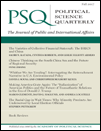 During his first 100 days as the 45th president of the United States, Donald J. Trump launched Twitter attacks against “Fake Tears Chuck Schumer,” members of the Republican Freedom Caucus, and a district court judge; accused his predecessor of “wiretapping” his phone, though there was no evidence for the claim; and baffled observers by appearing to lament a nonexistent terrorist attack in Sweden. Here we argue not simply that Trump’s norm-shattering rhetoric deviates from that of his predecessors but also that his discursive patterns constitute a double-edged rhetorical identity or signature. This rhetorical signature both certified Trump’s authenticity as a change candidate to a constituency eager for the disruption of politics as usual and now complicates his ability to govern in a political system still accustomed to those conventions.
During his first 100 days as the 45th president of the United States, Donald J. Trump launched Twitter attacks against “Fake Tears Chuck Schumer,” members of the Republican Freedom Caucus, and a district court judge; accused his predecessor of “wiretapping” his phone, though there was no evidence for the claim; and baffled observers by appearing to lament a nonexistent terrorist attack in Sweden. Here we argue not simply that Trump’s norm-shattering rhetoric deviates from that of his predecessors but also that his discursive patterns constitute a double-edged rhetorical identity or signature. This rhetorical signature both certified Trump’s authenticity as a change candidate to a constituency eager for the disruption of politics as usual and now complicates his ability to govern in a political system still accustomed to those conventions.Applied linguists have argued that “whereas in principle any speaker/writer can use any word at any time, speakers in fact tend to make typical and individuating co-selections of preferred words.” Although the concept of a “rhetorical signature” is not invariably attached to the outcome, computerized textual analysis has been used to identify linguistic differences among presidential candidates and presidents. Additionally, rhetoric scholars have isolated lines of argument, patterns of inference, and stylistic idiosyncrasies that not only distinguish one president from another but also affect governance. Here we label these characteristics a president’s rhetorical signature, a concept defined as “the symbolic marking distinguishing his mode of reasoning and expression from other presidents.”
The rhetorical signature that Donald Trump deployed as a presidential candidate, as president-elect, and during the first 100 days of his presidency includes seeming spontaneity laced with Manichean, evidence-flouting, accountability-dodging, and institution-disdaining claims. By offering apparently impromptu messaging in scriptless speeches and tweets at unusual hours, Trump broke with the sanitized, prepackaged rhetoric of his predecessors. His apocalyptic contrasting of demise and deliverance, parsing of individuals as winners and losers, and demonization of those with whom he disagrees also differentiate Trump’s rhetorical repertoire from that of those who previously held the office. Moreover, unlike his predecessors, Trump dismisses uncongenial evidence from institutionalized custodians of knowledge such as the Bureau of Labor Statistics. He not only relies on hearsay, anecdote, and suspect information in partisan media but also shifts the burden of proof to those who oppose his conclusions and shuns responsibility for distributing faulty information. At the same time, more so than those who came before him, Trump rejects conventional standards of accountability, denies discernible reality, including some of his own past statements, and, when caught, distracts. Finally, more so than past presidential contenders, when it serves his advantage, Trump questions the integrity of democratic institutions, some of which can hold a president accountable for abuse of power or misuse of evidence, including the electoral system, the courts, the justice system, and the media. These attacks are consistent with his dismissal of American exceptionalism and with his assertion that the country is in crisis. We will treat each signature cluster in turn.


